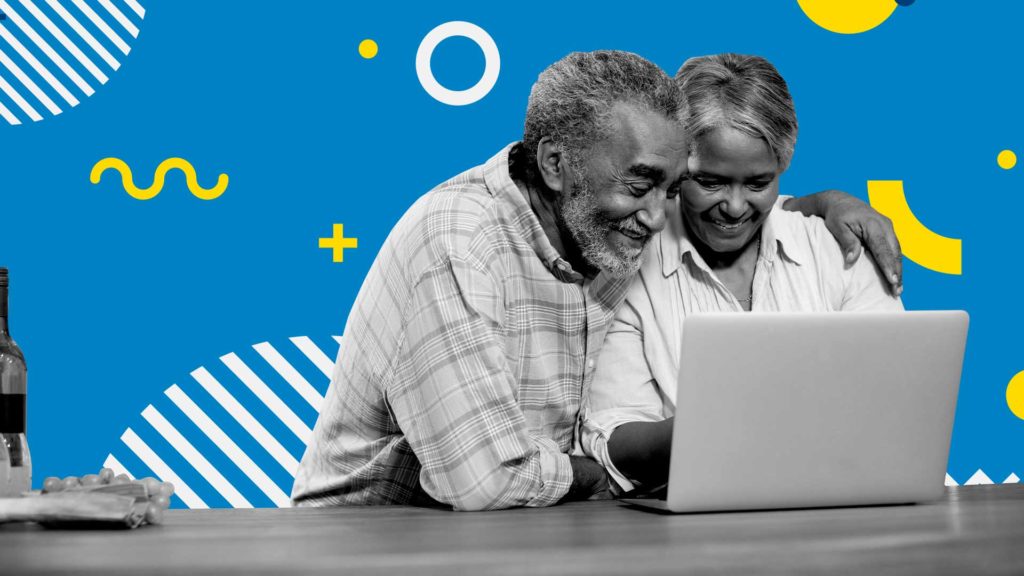
Some of the links on this page may link to our affiliates. Learn more about our ad policies.
15 Tips to Become Computer Savvy at an Older Age
Updated on: January 2023

The obstacle to computer literacy among seniors has been the assumption that it is best suited for the younger population and that its sole purpose is to keep up with the 21st century.
This belief has caused older adults to be apathetic and sometimes even fearful of computer trends. In most cases, tech developers have not targeted the older population with their campaigns or ads but instead have mostly focused on young people.
If they want older people to benefit from the numerous advantages of computer literacy, they need to use a stronger incentive and motivation. Reports from the Pew Internet and American Project say that, in 2014, 11 percent of people aged 65 and older owned a smartphone.
More than half used email, and 70 percent used the Internet on a daily basis and a third of them used social media sites such as LinkedIn and Facebook a rise from 13 percent in 2009, showing that older generations are more tech-savvy than previously thought.
Find What You Need
Importance of Technology and Being Computer Savvy
Two residents from Greenspring, which is a retirement community in Northern Virginia, Bill Raymond and Richard Schmidt are avid users of technology. Bill views his iPad as the most fascinating device he has ever seen.
He can access the Internet from anywhere. Richard started out using Skype to connect to his relative in California and now he uses Skype regularly with relatives from Texas, New York, and Florida. These two older adults are able to enjoy the positive aspects of technology in their everyday lives. Let’s look at the benefits of being computer savvy.
Fulfillment and Independence
The Internet is a place where a lot of information, chances for social interaction, and entertainment are found. Based on a report by the American Association of Retired Persons (AARP) seniors who keep abreast with the Internet regularly can produce a positive impact in areas of their lives such as:
- Being personally fulfilled.
- Preserving their health.
- Staying socially connected.
- Capability to function.
- Getting caregivers to support them.
A good illustration of personal fulfillment can be seen in how technology has revolutionized the workplace. In 2012, there were 6.7 million seniors aged 65 years and above who were still working and the number is expected to rise to 11.1 million by 2018, according to the United States Census Bureau.
For seniors who are still working, they can be able to deliver on their duties while working from home thanks to technology. This relieves them from the drag of daily commute and allows them to keep supporting themselves financially through their jobs.
Mental and Physical Stimulation
Video and computer games are common among the youth but did you know they can benefit seniors, too? Scientists from Poland found that all their subjects—whose age groups were between 65 and 75 years—were able to expand their attention, improve their memory, and increase their sequencing abilities after completing a series of video games.
Virtual recreational programs are another feature of technology which teaches you how to dance or do yoga or aerobics all of which are beneficial to your physical well-being.
Connecting Socially
Feeling isolated is common among seniors this is because most of them live alone due to their children moving away, friends living great distances, and, unfortunately, sometimes losing loved ones.
The good news is that connecting with your loved ones on email or social media platforms is that much easier thanks to technology. All you need is a phone or a computer that has a camera, an Internet connection and you are good to go.
Interacting with others makes you feel happier and less alone. Isolation can lead to depression.
According to a report by researchers from Michigan State University; seniors who occasionally spent time on the Internet drastically reduced their chances of suffering from depression.
A literature review conducted in 2012 by Perkins and LaMartin analyzed the Internet as a source of social support for caregivers who were aging and facing mental and physical challenges that come with aging.
The authors identified several advantages that Internet communication had over traditional support groups. This included not having to worry about transportion and time and reaching a broader audience of helpful members.
Goods Delivered to Your Doorstep
Mobility is an issue for some seniors who are disabled, suffer from chronic pain, Alzheimer’s disease, and dementia. With a computer and Internet connection, buying your groceries and shopping for all your needs is only a click away.
Chances are you will find cheaper deals. Additionally, you will find that most companies will deliver the goods to your doorstep.
Applications that Improve Your Daily Life
Various applications can be helpful to seniors for tracking your diet, counting the number of calories you burn while walking, and even reminding you to do activities such as taking your medicine or walking the dog.
Tips to Become Computer Savvy
Following are some tips to become computer savvy.
1. Conquer Your Fear
Fear holds us back from living our best lives. While exploring a new thing can be intimidating and scary, you know that you will get better with time. You have not come this far in your life by being timid, but by being brave.
Look back at all those things that you were once afraid of that now enjoy, maybe it was making a speech or dancing and see how you conquered that! This too will be fun.
2. Have A Positive, Open Attitude
It is true that your attitude determines your altitude. Have an open attitude towards learning about computers and the Internet.
Your friends and colleagues have probably said some negative things about it and therefore held some strong opinions against it but now is the time to let that go and find out on your own. You may like the experience a lot and even find it exciting.
3. Reach Out
Do not be afraid to reach out and ask for help when you make the choice to learn about technology. Most young people are really good at this and will be more than willing to help.
This could also be a great time to spend time and bond with your child or grandchild. If you are an older person, who is still working you could request your younger colleagues or someone from the IT department to spend some of their breaks teaching you.
4. Google
In some cases, you may not have someone physically there to assist you, not to worry Google is your friend. Once you are connected to the Internet, you can use Google to find out anything you need to know.
If you search ‘how to use Microsoft word,’ Google will provide you with countless detailed results to pick from. Follow the instructions that are simplest to you.
5. Basic Settings Should Suit Your Needs
Making simpler alterations to suit your needs such as larger text size and louder sounds will improve your experience.
6. Write Down Your Passwords
As you get older you may experience some level of forgetfulness which is quite normal. It is therefore advisable to have a backup plan. Write down your new passwords in your journal so that in the event you log out and forget, you can always get them in hard copy.
7. Take Your Time
Take your time as you explore this new topic, take short breaks when you feel exhausted. Don’t be too hard on yourself. Be patient and know that you cannot learn everything in a day. After learning a new skill, take time to practice it repeatedly so that you really understand it.
8. Battery
Only charge your computer, tablet, or phone when the battery is running low on charge. Charging your device all day can reduce the battery life.
9. Stay Connected
It is okay to switch off your computer when you are not using it, you can switch it on every now and then to see if you have any new messages for example once or twice a day.
However, with your phone, you do not need to switch it off since that can prevent people from reaching you in real time.
10. Personal Information
If you are making an online transaction or storing bank details, it is important to speak to your bank and understand the precautions you need to take. However, your information is safe in such situation.
11. Always Opt for Touch Screens
Research shows that seniors get on better with a tablet that has a touchscreen than a traditional computer so given a choice always choose a tablet or a smartphone.
12. Search History
If you share your tablet or computer with someone say a spouse or your grandchildren who want to play games but you want to keep your activities private, always delete your search history when you are done.
13. Most Things are Free
While in the real world most things are not free, on the Internet they are. According to a BBC article, an application for counting your calories or playing your favorite puzzle will not cost you a thing. However, be sure to check first.
14. Read Reviews Before Buying Items Online
If you want to buy a particular product or use a certain service say booking a hotel online, online reviews are very helpful. Most companies will not be honest about their shortcomings on their website, but a reviewer will be.
15. Virus/Malware Scanning
Invest in a good antivirus; this is a great way to keep your information protected. The good news is that most computers nowadays come with an inbuilt virus and malware and the scanner is quite user-friendly.
Sources
- https://lifehacker.com/5919612/how-can-i-make-my-parents-more-tech-savvy
- http://www.telegraph.co.uk/technology/internet/11200872/10-ways-to-help-older-people-use-the-internet.html
- https://www.monster.com/career-advice/article/computer-skills-for-older-workers
- https://www.huffingtonpost.com/jim-t-miller/helping-seniors-learn-new_b_7584758.html
- https://patimes.org/older-us-ready-tech-savvy-older-adults/

